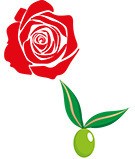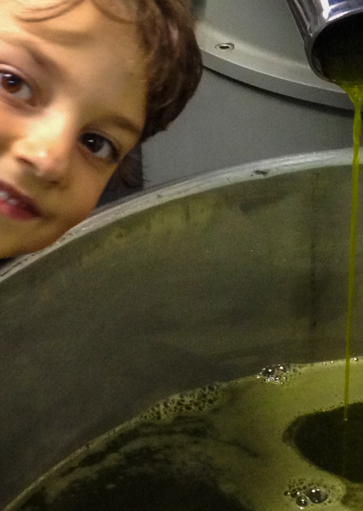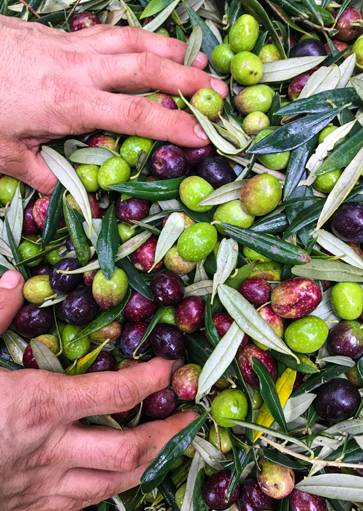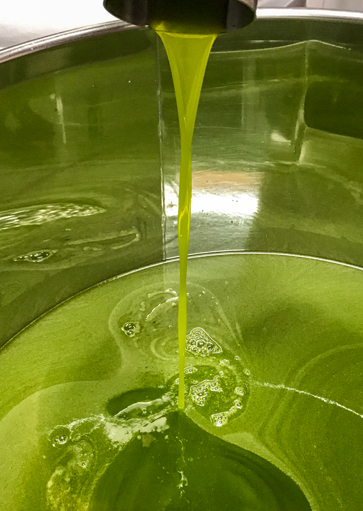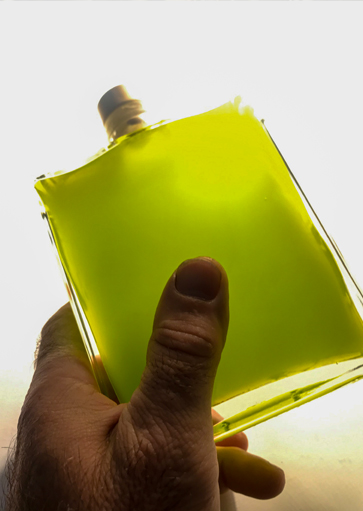By: Bruno Pistoni – Food and Wine Consultant:
The Extra Virgin Olive Oil, Rosa and Meo, is Monocultivar: Itrana. There are no flaws. Color: intense golden yellow with green nuances. It is opaque. Smell: the nose is broad and enveloping. Decisive and elegant. Hints of medium ripe red tomato, apple, and banana which blends with a floral scent of rose. Aromatic notes of basil, mint, and oregano, with a hint of black pepper. Taste: enveloping and complex with tones of field vegetables, broad beans, celery with a clear sweet almond finish. A slight spicy bitterness exists but these characteristics are not exceptionally prevailing. This oil can be defined as medium fruitful.
LA REPUBBLICA
We are also intrigued by the olive grower Catullo Manciocchi. Rosa & Meo is the limited edition of 179 bottles produced annually, a number with a very specific meaning. “Numbers make sense, I’ve always loved them – he says-. The bottles are and will always be 179 because that is the sum of the ages of Rosa & Meo, my grandparents to whom I owe the passion for this work. Here everyone has a piece of land with olive groves and vineyards, but selling the bottle at the right price with the competition from large-scale distribution is difficult. So in protest, last year I also produced Clandestino, an oil that pays homage to all the small producers who struggle to create a space for themselves. Mine is a production that does more culture than profit. I am committed to making our oil known in other countries such as Denmark, which has fascinated me ever since a Danish jazz drummer came to live in Cori. I also carry with me a book that I recommend everyone to read: Extra Virginity, the sublime and scandalous world of olive oil by Tom Muller”.
LA REPUBBLICA
We are also intrigued by the olive grower Catullo Manciocchi. Rosa & Meo is the limited edition of 179 bottles produced annually, a number with a very specific meaning. “Numbers make sense, I’ve always loved them – he says-. The bottles are and will always be 179 because that is the sum of the ages of Rosa & Meo, my grandparents to whom I owe the passion for this work. Here everyone has a piece of land with olive groves and vineyards, but selling the bottle at the right price with the competition from large-scale distribution is difficult. So in protest, last year I also produced Clandestino, an oil that pays homage to all the small producers who struggle to create a space for themselves. Mine is a production that does more culture than profit. I am committed to making our oil known in other countries such as Denmark, which has fascinated me ever since a Danish jazz drummer came to live in Cori. I also carry with me a book that I recommend everyone to read: Extra Virginity, the sublime and scandalous world of olive oil by Tom Muller”.
GAMBERO ROSSO
Catullo Manciocchi’s oil, which enchanted the land of fairy tales with his Rosa & Meo, is also known in Denmark. We are talking about a label dedicated to Rosa and Mariano Cappa who started olive production in this area with 49 Itrana cultivar plants. The itrana that Catullo Manciocchi made known to the public of local gourmets. In fact, his Rosa & Meo is exported and sold almost exclusively in this country as it is a production that is not really large numbers: in just over 4 hectares of olive groves about 500 plants are planted. The rest is taken care of by the care of the trees and attention during processing in the mill.
GAMBERO ROSSO
Catullo Manciocchi’s oil, which enchanted the land of fairy tales with his Rosa & Meo, is also known in Denmark. We are talking about a label dedicated to Rosa and Mariano Cappa who started olive production in this area with 49 Itrana cultivar plants. The itrana that Catullo Manciocchi made known to the public of local gourmets. In fact, his Rosa & Meo is exported and sold almost exclusively in this country as it is a production that is not really large numbers: in just over 4 hectares of olive groves about 500 plants are planted. The rest is taken care of by the care of the trees and attention during processing in the mill.
h24notizie
Soul of Trees; The Nymphs Hidden in the Olive Trees of Cori.
Cori’s EVOO still a protagonist of a promotional tour in Denmark, a country that has always been attentive to food safety and therefore, a large consumer of Italian green gold. In the last days of August, the Itrana Cori Extra Virgin Olive Oil is brought for tasting in Copenhagen by the olive grower, Catullo Manciocchi.
He is the one who talks to the Danes about Extra Virgin Olive Oil made in Cori and about local olive growing. In addition to the oils of his company, Rosa & Meo, Manciocchi also brings with him two other companies, Rupebianca by Ubaldo Caucci Molara, and Impervio by Dante D’Elia. The young and promising olive and oil producers who produce an Itrana Extra Virgin Olive Oil in limited quantities, but of very high quality. The group is led by professional tasters from Capol Latina. The trio has long been engaged in a synergistic strategy not only of marketing, but also of promotion and enhancement in Italy and abroad of everything that revolves around the centuries old olive growing tradition and the agriculture vocation of their territory. In the cradle of the Vikings, Cori’s EVOO is set in a particular setting, which confirms the constant cultural, economic and social exchanges between the city of art and Jutland.
A secular olive tree found near Giulianello set a planned initiative by Catullo Manciocchi who is accompanied by two well known Danish artists and members of that community that seasonally reside in Cori are: photographer Ingrid Bugge, and storyteller Vigga Bro. Together they are presenting the artistic and cultural project “Soul of Trees” which draws inspiration from the olive trees of Cori. The nymphs hidden in the olive trees discovered by Ingrid Bugge are brought to life by the stories interpreted by Vigga Bro. In particular, the tree found near Giulianello, highlights the embrace of two lovers immortalized by Zeus, thus the nickname “The Love Tree”.
h24notizie
Soul of Trees; The Nymphs Hidden in the Olive Trees of Cori.
Cori’s EVOO still a protagonist of a promotional tour in Denmark, a country that has always been attentive to food safety and therefore, a large consumer of Italian green gold. In the last days of August, the Itrana Cori Extra Virgin Olive Oil is brought for tasting in Copenhagen by the olive grower, Catullo Manciocchi.
He is the one who talks to the Danes about Extra Virgin Olive Oil made in Cori and about local olive growing. In addition to the oils of his company, Rosa & Meo, Manciocchi also brings with him two other companies, Rupebianca by Ubaldo Caucci Molara, and Impervio by Dante D’Elia. The young and promising olive and oil producers who produce an Itrana Extra Virgin Olive Oil in limited quantities, but of very high quality. The group is led by professional tasters from Capol Latina. The trio has long been engaged in a synergistic strategy not only of marketing, but also of promotion and enhancement in Italy and abroad of everything that revolves around the centuries old olive growing tradition and the agriculture vocation of their territory. In the cradle of the Vikings, Cori’s EVOO is set in a particular setting, which confirms the constant cultural, economic and social exchanges between the city of art and Jutland.
A secular olive tree found near Giulianello set a planned initiative by Catullo Manciocchi who is accompanied by two well known Danish artists and members of that community that seasonally reside in Cori are: photographer Ingrid Bugge, and storyteller Vigga Bro. Together they are presenting the artistic and cultural project “Soul of Trees” which draws inspiration from the olive trees of Cori. The nymphs hidden in the olive trees discovered by Ingrid Bugge are brought to life by the stories interpreted by Vigga Bro. In particular, the tree found near Giulianello, highlights the embrace of two lovers immortalized by Zeus, thus the nickname “The Love Tree”.
